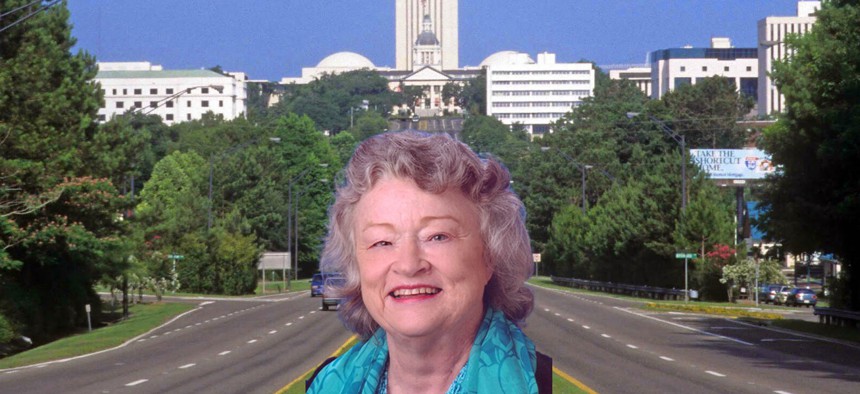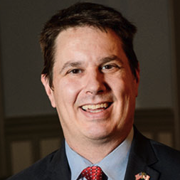Opinion
'Is this Steve Schale? Hi, this is Lucy Morgan'
A veteran political consultant remembers the late St. Petersburg Times capital bureau chief.

Photo illustration by Anabel Dayao/City & State. Photos via State Archives of Florida (Morgan), Tournament Committee/Flickr (Tallahassee).
Lucy Morgan, the longtime capital bureau chief for what was then called the St. Petersburg Times, died this week at the age of 82. Steve Schale – a lobbyist, political consultant and occasional City & State contributor – penned this tribute to her on his personal blog, republished here with his permission.
The speaker couldn’t have been more clear:
“If Lucy Morgan calls, take a message, do not talk to her, get off the phone as fast as possible, and call me.”
That was the clear message this then-21-year-old took home from the 1996 Florida Democratic Party’s campaign manager boot camp. In fact, it is literally the only thing I remember from those two days.
If Lucy Morgan was calling, something bad had happened to your boss, or was about to happen to you, or both, and you needed a professional to help you out of the mess you were clearly in. Talking to her would only make it worse.
Previously in Opinion – Richard Morgan at 92, an appreciation: As the husband of Florida journalism legend Lucy Morgan, Richard remains her biggest fan and loudest cheerleader, Florence Snyder writes.
Driving the fear of God into each of us kids wasn’t without merit. After all, Lucy, then the Tallahassee bureau chief of the state’s largest newspaper, wasn’t just any reporter. She was the first woman to win a Pulitzer Prize for investigative reporting and had even gone to jail to protect a source. Her bio reads like a prize-fighter’s resume of defeated foes. Though in Lucy’s case, it was the careers of bad politicians that hung on her wall.
So just imagine the utter fear streaming through my veins when this kid, who frankly had zero business managing one of the state’s most expensive and consequential state house races, answered the phone in the campaign office late one night about ten days before the election.
“Is this Steve Schale? Hi, this is Lucy Morgan.”
I don’t remember what I said – but I remember what I felt: “Oh shit.” At that moment, I was sure my exceptionally short career was over, even if I didn’t know why.
I’ve been a political hack for nearly three decades, and a flack for 20-plus years of that time. Over that time, I’ve spoken to hundreds if not thousands of reporters, many of whom I now consider friends. But the way I think about dealing with the media and frankly The Process in general, was heavily influenced by the first two reporters I dealt with in my professional life, two legendary women from the same era: Margo Pope of the St. Augustine Record and Lucy Morgan of the then-titled St. Petersburg Times.
Both were doggedly tough, their careers coming of age at a time when they were true trailblazing pioneers. They were women breaking story after story in a decidedly male-driven industry. Respect for them was always due, though respect from them had to be earned and was never a guarantee.
And as happens as one gets older, I’ve come to understand just how important both were to the development of my career.
I knew Margo before I got into my career. She had been active at several points of my youth, so when I made the transition from actual kid to kid source/subject/flack, she was often gracious (though quite tough), and took the time to help me understand what was news, and what wasn’t, and to tell me when I was doing something dumb and foolish.
Where Margo was familiar, Lucy had been built up to mythical status, this person I did not know – probably never wanted to know – because she could end your career simply by calling you. Heck, in the mind of this 21-year-old, she could probably end it just by knowing your name.
So when that call did come and I heard that name on the other end of the phone, the anxious stutter I have fought since youth kicked right in. Clearly sensing the fear and panic in my voice, she rescued me: “Steve, you aren’t in trouble. I just need to know X.” Of course, "X" was just a routine question about spending in our race. Certainly nothing that would end my career in dramatic, above-the-fold fashion.
We went on to win that race, and not long after, she wandered into our Capitol office. Hardly the sword-wielding figure in my mind, Lucy came across like everyone’s wonderful aunt, albeit an aunt with a Pulitzer Prize for taking down corrupt politicians. She took the time to thank me – a kid – for my help on that story, and wanted to meet my boss, who had won a seat that most thought he would lose.
Over the next few years, I got to know her a bit, mostly as an aide setting up her visits with my boss, but occasionally in the journalist role. She’d come by and see where he was on issues or ask about the politics of our district. Her presence at my desk still put the hair up on my back of my neck, but I began to understand what made her good: She was super competitive, knew literally everyone in that building, which meant she knew more than anyone.
In 2002, I joined Doug Wiles in Tallahassee in a new role, with him as House Democratic leader, and me as his communications director. I had zero training to be a flack, and like most things in my career, probably had no business in the job when I first got it. I was at best a rising political hack, hardly a seasoned press secretary.
I hadn’t been in the job long and Lucy paid me a visit. She didn’t stay long but offered that she thought Doug was smart to bring me over, and thought I would do fine in the job. Then she went on to lay out the terms of our relationship: She would ask questions, my job was to answer them or get answers to them. If I was responsive to her inquiries or desires to talk to certain members, we’d be fine. If I wasn’t or if I scooped her to another reporter, she’d remember. But one thing I could never do: lie to her. She’d figure it out – and she’d definitely remember.
I broke that last rule once. At the time, I didn’t think it was a big deal. She had learned of a meeting she thought she had a right to cover (she didn’t), and rather than me telling her to pound sand, I told her there was no meeting. (Frankly, I had panicked a bit, not used to being in that situation before.)
But of course, she found out. I never made that mistake twice. Spin all you want, she reminded me, that’s your job. But don’t lie, don't ever lie, it is the only way we can have the trust required in the flack/journo relationship. It is a lesson that to this day I mention when I get a chance to talk with aspiring hacks in college classes.
As happens in a career, time passes by. I got to know her a little better over a lot more chats and I got to know her a little better as a person. But unlike with the journalists who were closer to my age at the time, I could never break this sense that she was this legend, and in her mind, I was just some kid.
Not long after the 2008 elections, Lucy was asked by Campaigns & Elections magazine to create a list of the ten most influential Democrats and Republicans in Florida.
I ended up on her list.
I called her, “Lucy, I am grateful, but not worthy of this by any means. It is almost embarrassing considering the people not on this list.”
Her response: “Listen Steve, I wasn’t being nice. You earned a spot on that list, that is why you are there. That is the end of this discussion.”
It was easy then (and honestly still is) for me to struggle with my place in this town, and earning her respect meant something. It allowed me to have a sense of belonging, that maybe this kid from a small town, who doesn’t easily fit into the often hyper-Type A world of politics and harbored a healthy imposter complex about it, that maybe I would be OK.
If Lucy Morgan, this titan who had blazed her own trail to greatness, if she thought I had made it, then maybe I should have more confidence about my own place. Far more than my name on a list, it was her opinion that truly meant something to me.
Years later, I tried to tell her the story of this moment in my life and why it mattered and why she mattered. In classic Lucy style, she basically told me to just shut my mouth.
When she retired formally (as we all learned, retirement was just a word to Lucy), the now-renamed Tampa Bay Times threw quite the party for her. Many showed up – current and former statewide electeds, long lost legislators, the town’s power brokers, both old and new, Republican and Democratic alike, colleagues from all over – and at least one hack who she stopped in the hall to make sure he was coming.
I am not sure there is another person, journalist or not, who would have commanded an audience like that. But as a dear friend of mine said the other day about her, “She’s probably done more good for this state than everyone else over in that building combined.” The state bestows the “Great Floridian” distinction on the finest among us, and it seems like she’d be a perfect honoree.
I heard a few weeks ago that Lucy wasn’t doing well, and that the prognosis wasn’t good. I sat down and wrote this the night I heard, and struggled with whether to share it then. I chose not to because, after all, this was Lucy Morgan. Time and time again, her adversaries learned going toe-to-toe with her was a bad idea. I didn't want to be the guy betting against her. Sadly her illness was one adversary she couldn’t overcome.
But I am grateful my journey crossed hers. Grateful I got to learn from how she carried herself and handled her business. Grateful she was there when I needed to learn, and there to encourage, when I needed that too. Grateful she took a liking to me and let me become her friend. And most importantly, grateful I never ended up in her crosshairs. Even in the last few years, the hair on my arms would stand up a bit when I saw that name on my phone or in my inbox.
As former Florida Attorney General Richard Doran said on X after her passing was made public: “Plain and simple. She was the best this town ever saw.” There will never be another like her. Thank you Lucy. Godspeed my friend.
Steve Schale, now a lobbyist with The Advocacy Group at Cardenas Partners, also has been an advisor to President Barack Obama and Florida candidate for governor Gwen Graham.
NEXT STORY: Your view: Here are some basic guidelines for submitting op-eds, letters to the editor
